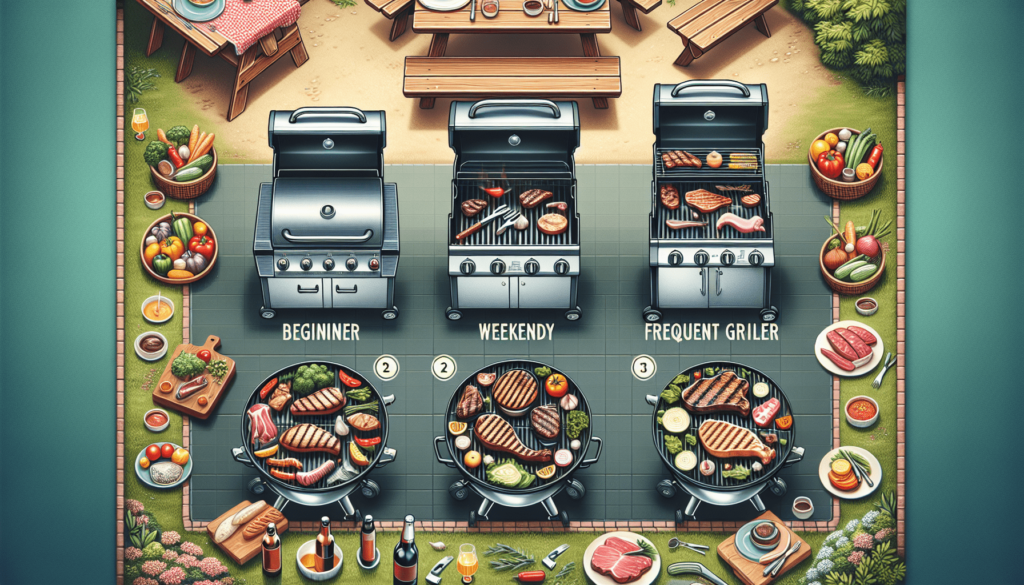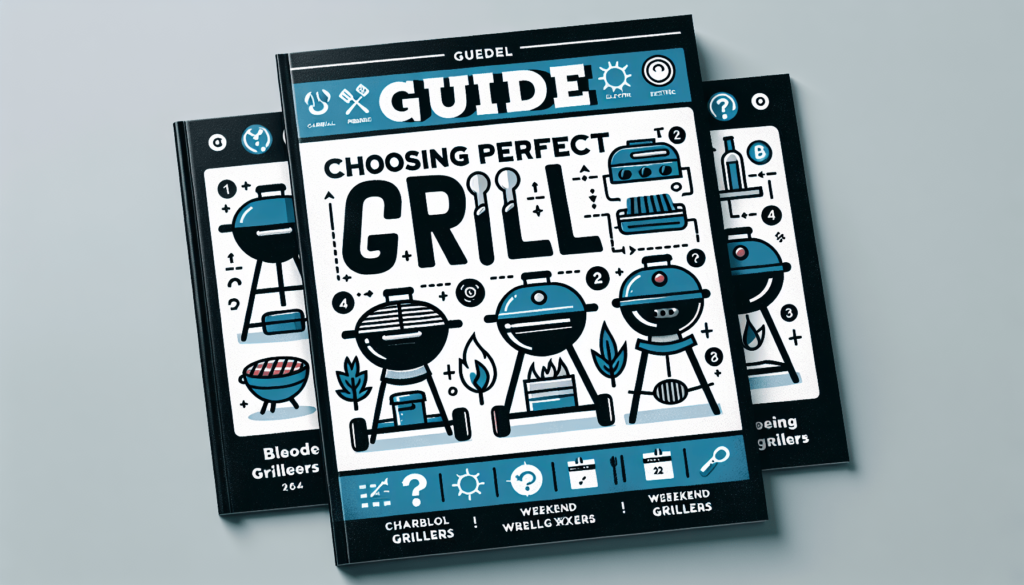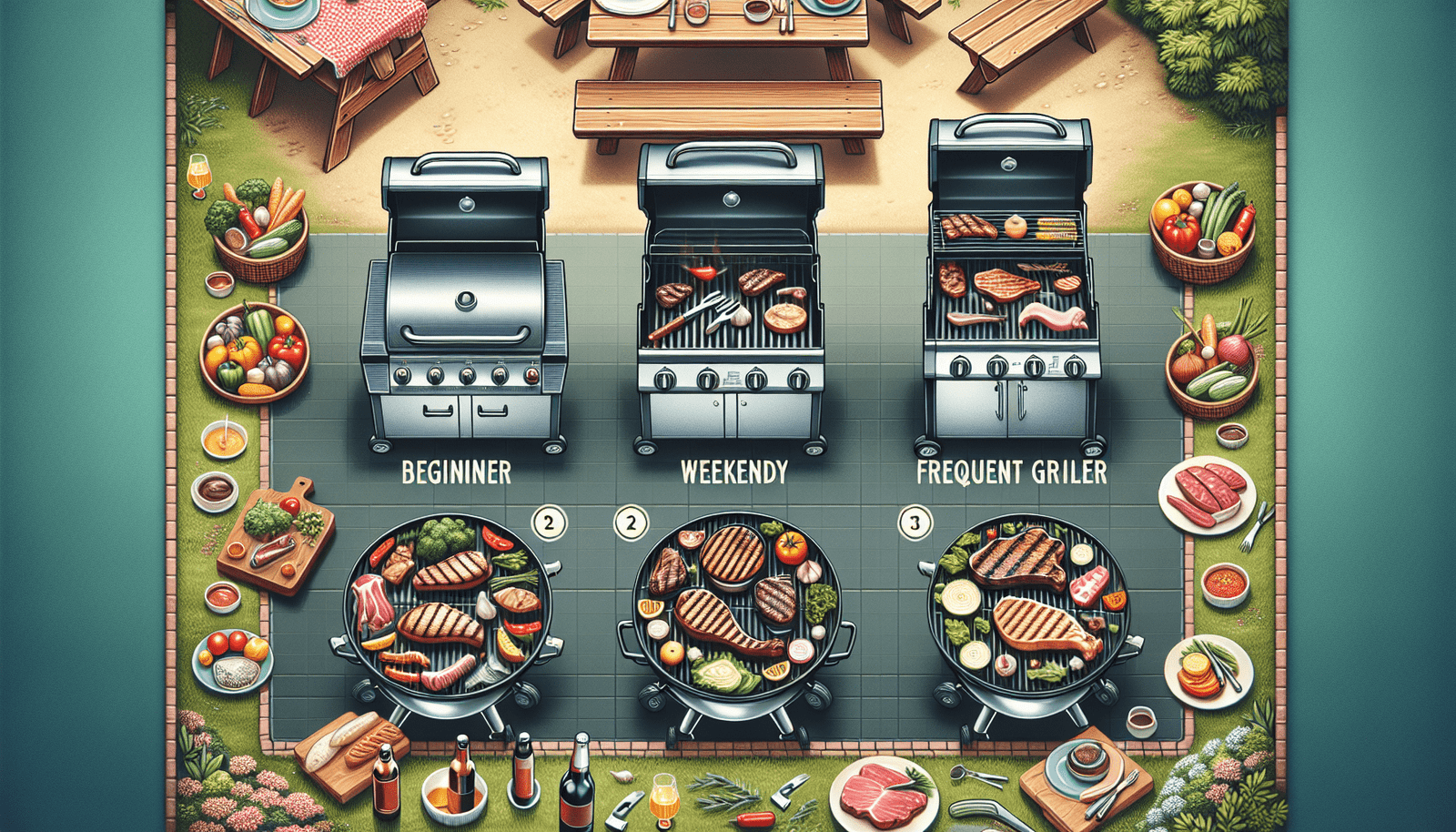Are you a grilling enthusiast, eager to find the perfect grill that suits your needs? Choosing the right grill can be a daunting task, with so many options available in the market. From charcoal to gas, portable to built-in, selecting the ideal grill requires careful consideration of your personal preferences and grilling habits. In this article, we will guide you through the essential factors to consider when making this important decision, ensuring that you find the grill that will satisfy your culinary desires and make every cookout a memorable one.

Fuel Type
When it comes to choosing the right grill for you, one of the first decisions you’ll need to make is the fuel type. The three main options are gas grills, charcoal grills, and electric grills. Each has its own advantages and considerations, so let’s take a closer look.
Gas grills
Gas grills are known for their convenience and ease of use. They typically run on propane or natural gas, which means you won’t have to deal with the mess and hassle of charcoal or wood. Gas grills also offer excellent temperature control, allowing you to quickly adjust the heat as needed. Moreover, they ignite easily, saving you time and effort.
Charcoal grills
Charcoal grills are beloved by many grilling enthusiasts for their distinct smoky flavor and versatility. They use charcoal briquettes or lump charcoal as their fuel source, creating an intense heat that is perfect for searing steaks or slow-cooking ribs. Charcoal grills take longer to heat up compared to gas grills, but they offer greater cooking versatility and can reach higher temperatures. Additionally, the act of lighting and tending to a charcoal fire can be a fun and rewarding experience for some grillers.
Electric grills
Electric grills are becoming increasingly popular due to their convenience and suitability for indoor or small outdoor spaces. These grills simply need to be plugged into an electrical outlet to heat up, eliminating the need for fuel or fire. Electric grills are particularly well-suited for apartment dwellers or those with strict fire regulations. However, they may not provide the same flavor and searing capabilities as gas or charcoal grills.
Size
Once you’ve decided on the fuel type, the next consideration is the size of the grill. To determine the right size for you, there are two main factors to keep in mind: your available space and your cooking needs.
Consider your space
Before purchasing a grill, evaluate the available space in your backyard or patio. Measure the area where you plan to place the grill to ensure it will fit comfortably. Consider any additional clearance needed for safety reasons or if you plan to add any accessories or storage shelves to the grill.
Consider your cooking needs
The size of the grill also depends on how much food you usually cook at once. If you frequently entertain large groups or have a big family, a larger grill with multiple burners or cooking zones may be ideal. However, if you primarily cook for yourself or a small group, a smaller grill with a single burner may suffice. Remember that a larger grill will require more fuel and maintenance, so choose a size that matches your usual cooking needs.
Budget
Setting a budget before diving into the world of grills is crucial. Grills can range in price from budget-friendly options to high-end models with all the bells and whistles. Consider how often you plan to use the grill and how much you’re willing to invest in this new addition to your outdoor cooking arsenal.
Set a budget
Determine the maximum amount you’re willing to spend on a grill. Setting a budget helps narrow down your options, ensuring you don’t overspend on features or accessories that you may not need. It’s important to strike a balance between your desired features and your budget.
Compare prices
Once you have a budget in mind, compare prices of grills within that range. Keep an eye out for any discounts or sales promotions that may be available. Don’t forget to factor in the cost of additional accessories and fuel. It’s also worth considering long-term costs, such as maintenance and replacement parts, when comparing prices.

Cooking Style
Your preferred cooking style will significantly impact the type of grill that best suits your needs. Grills can provide either direct or indirect heat, each with its own advantages and purposes.
Direct heat
If you enjoy quick-cooking foods such as burgers, steaks, or kebabs, a grill that provides direct heat is essential. Direct heat grilling involves placing the food directly above the heat source, allowing for high temperatures and quick searing. Gas and charcoal grills excel in providing direct heat, making them popular choices for those who love a good char.
Indirect heat
Indirect heat grilling is perfect for slow-cooking larger cuts of meat or delicate foods that require a gentler heat. This cooking method involves placing the food next to, rather than directly above, the heat source. This allows for more even and controlled cooking, reducing the risk of burning or unevenly cooked food. Both gas and charcoal grills can be configured for indirect cooking by utilizing cool zones or utilizing a smoker box for additional flavor.
Temperature Control
Maintaining consistent and accurate temperatures is crucial for achieving perfectly cooked meals on your grill. Look for features that allow for easy temperature control and monitoring.
Thermometers
A built-in thermometer on the grill’s hood or lid is an invaluable tool for monitoring the internal temperature of your grill. This helps you determine when it has reached the desired temperature and make adjustments as needed. For added precision, consider using an instant-read meat thermometer to check the doneness of your food.
Air vents
Many charcoal and some gas grills have air vents that allow for temperature control. These vents enable you to adjust the airflow, thereby influencing the intensity of the heat. By opening or closing the vents, you can increase or decrease the temperature inside the grill to suit your cooking needs.
Multiple burners or zones
Some gas grills offer multiple burners or cooking zones, allowing for precise temperature control in different areas of the grill. This feature enables you to simultaneously cook various foods at different heat levels or create distinct hot and cool zones for different cooking methods. Consider your cooking style and preferences when deciding if multiple burners or zones are necessary for your grilling needs.
Grill Features
Grill features can enhance your overall grilling experience and make your cooking more efficient and enjoyable. Consider the following features when choosing the right grill for you:
Material
The material of the grill can greatly impact its durability and heat retention. Stainless steel and cast iron are popular choices due to their durability and resistance to rust. These materials can handle high temperatures and are easy to clean. However, they may come at a higher price point. Porcelain-coated grills offer a sleek and easy-to-clean surface but may be more susceptible to chipping or cracking.
Cooking grates
The material and design of the cooking grates play a role in the flavor and sear marks of your food. Cast iron grates are excellent at retaining and distributing heat evenly, resulting in beautiful sear marks. Stainless steel grates are durable and easy to clean but may not provide the same sear marks. Porcelain-coated grates offer a balance of easy maintenance and heat retention.
Extra storage
Consider whether you need additional storage space for grilling tools, accessories, or fuel. Look for grills with side shelves or storage cabinets where you can keep your utensils, plates, and other grilling essentials within easy reach. This feature can improve your overall grilling efficiency and organization.
Wheels or portability
If you plan to move your grill around frequently or store it in a different location when not in use, look for models with wheels or a portable design. This makes maneuvering and transporting the grill much easier. Ensure that the wheels are sturdy and lockable for stability during cooking.
Maintenance
Regular maintenance and cleaning are essential for ensuring the longevity and performance of your grill. Consider the following factors when selecting a grill that is easy to maintain:
Ease of cleaning
Look for grills with removable parts and easy-to-clean surfaces. Removable cooking grates and drip trays simplify the cleanup process by allowing you to soak and scrub them separately. Additionally, grills with grease management systems or easy-to-access grease trays can help prevent buildup and make cleaning a breeze.
Durability
A durable grill that can withstand the elements and frequent use will save you money in the long run. Choose a grill made from high-quality materials that can withstand high temperatures, rust, and weather conditions. Read reviews and consider the warranty offered by the manufacturer to gauge the durability and reliability of the grill.
Brand and Reputation
The brand and reputation of a grill manufacturer should not be overlooked. Consider the following tips when researching brands:
Research brands
Spend some time researching various grill brands to gain insights into their reputation, customer feedback, and history. Established brands with a solid track record are often a safer bet, as they have proven their quality and longevity in the market. However, don’t discount newer or lesser-known brands that may offer unique features and competitive prices.
Read reviews
Customer reviews are an excellent source of information when it comes to determining the performance and reliability of a grill. Look for common themes or issues mentioned in the reviews to get a sense of the potential pros and cons. Keep in mind that individual experiences may vary, but reviews can provide valuable insights into the overall satisfaction of customers.
Cooking Accessories
To enhance your grilling experience, there is a wide range of cooking accessories available. Consider the following accessories that can complement your grill:
Rotisserie attachments
If you enjoy roasting whole chickens, turkeys, or large cuts of meat, a rotisserie attachment can be a game-changer. This accessory slowly rotates the meat, allowing for even cooking and a juicy, flavorful result. Check if the grill you’re considering has a compatible rotisserie attachment or if one can be purchased separately.
Grill covers
Protecting your grill from the elements is essential for extending its lifespan. Invest in a high-quality grill cover that is specifically designed for your grill model. The cover should be weather-resistant, durable, and properly fitted to ensure maximum protection.
Grill utensils
Having the right grilling utensils is crucial for safe and efficient cooking. Consider investing in a set of stainless steel grilling tools, including spatulas, tongs, grill brushes, and skewers. Look for utensils with long handles to keep your hands away from the heat. Don’t forget a meat thermometer for precise temperature readings.
Safety Features
Grilling should always be an enjoyable and safe experience. Look for grills that offer the following safety features:
Lid and handle construction
Choose a grill with a sturdy lid and heat-resistant handle. The lid should fit tightly to trap the heat and smoke inside while preventing any flare-ups. The handle should stay cool to the touch, even when the grill is at high temperatures, to minimize the risk of burns.
Stability and sturdy design
A stable and sturdy grill is essential to prevent accidents and ensure even cooking. Look for grills with a solid base, strong legs, and a robust construction. Consider models with features like locking wheels or stabilizing mechanisms to enhance stability during use.
By considering these important factors such as fuel type, size, budget, cooking style, temperature control, grill features, maintenance, brand and reputation, cooking accessories, and safety features, you can confidently choose the right grill that suits your needs and preferences. Remember to weigh the pros and cons of each option and prioritize the features that are most important to you. With the perfect grill in your backyard, you’ll be ready to savor countless delicious meals and create lasting memories with family and friends. Happy grilling!

